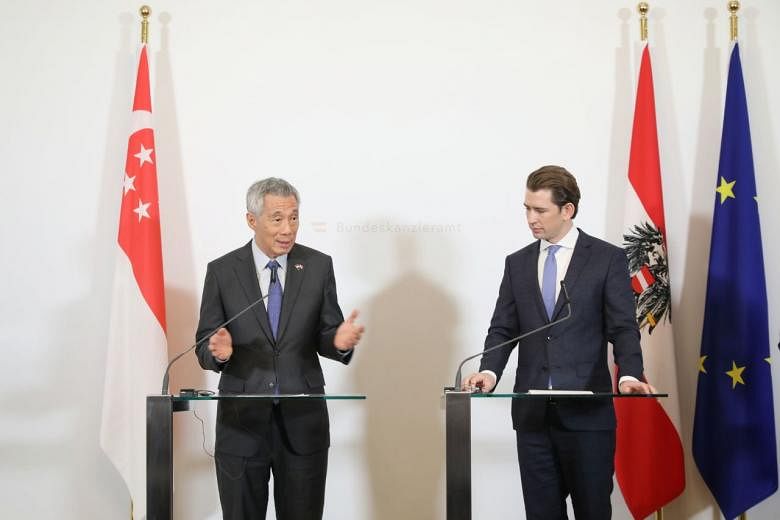VIENNA - Singapore and Austria will exchange ideas and know-how on their experiences navigating the digital economy and in areas such as digital government, e-commerce and emerging technologies like artificial intelligence.
Both countries on Wednesday (Oct 17) inked a pact to step up cooperation in digitalisation and information and communications technology, during Prime Minister Lee Hsien Loong's official visit.
Shortly after arriving in Vienna, PM Lee was received by Chancellor Sebastian Kurz and a military honour guard at the Federal Chancellery.
Both leaders then witnessed the signing of a Memorandum of Understanding (MOU) by Communications and Information Minister S. Iswaran and Austria's Federal Minister of Digital and Economic Affairs Margarete Schrambock.
"Singapore and Austria share similar perspectives on many issues - embracing openness to free trade, to multilateralism, to the rule of law - and there is a great deal we can do together to bring our countries and our regions closer," Mr Lee said at a press conference with Mr Kurz after their meeting, which is their third this year.
"As small countries that rely on human talent, we also have a common aim of cultivating a culture of innovation and productivity, and using technology to upgrade our economies and improve our peoples' lives," Mr Lee added.
"Like Austria, Singapore is pushing forward with digitalisation and we appreciate working with like-minded partners to share experiences and exchange ideas."
The agreement will focus on the exchange of information and best practices in four areas:
- digital economy and digitalisation strategies, including helping small and medium enterprises and promising start-ups;
- digital government, including digital national identities and Smart Nation applications;
- electronic commerce and digital trade; and
- emerging technologies, including novel applications of blockchain, the Internet of Things and artificial intelligence, and regulatory approaches.
Both leaders also highlighted opportunities to deepen cooperation in other fields.
PM Lee noted there are 220 Austrian companies in Singapore, with investments of over S$2 billion, and wants more of such firms to consider the Republic as a gateway to Asia.
Tie-ups in research and development and between universities were also areas both sides could pursue progressively, he said.
Singapore also has much to learn from Austria's rich heritage in arts and music, and he hoped there would one day be a performance of the Vienna Philharmonic Orchestra and the Singapore Symphony Orchestra.
Mr Kurz added: "We are both small countries in size, but innovative and economically successful." He noted Austria was a good gateway to southern and eastern Europe.
He was also glad to have more tourists from Singapore. "We have a bit more land," he quipped, pointing to opportunities for skiing and sports in his country.
Citing climate change and cyber security, he said these are two areas in which Asia and Europe could work closely.
PM Lee also thanked Austria for its consistent and strong support for the European Union-Singapore free trade agreement (EUSFTA) that will be signed in Brussels on Friday (Oct 19).
"Once in force, it will further strengthen economic ties between Singapore and Austria and set them in a broader context," he said.
As the present chair of Asean and coordinator for Asean-EU relations, Singapore will continue to work with Austria, which currently holds the EU presidency, he added, saying: "The EUSFTA can be a pathfinder to an EU-Asean FTA."
Asean is also working towards a digital integration framework to deepen regional connectivity, and can explore cooperation with the EU in this area, he said.
Mr Lee was also asked whether he would advise Britain to stay in the customs union after it leaves the EU, or whether he thought they could have a better deal through FTAs with countries like Singapore.
"It is always easier to make an agreement with one country instead of one organisation of 28 countries," he replied.
"But whether that means it is better for the British to go it alone and therefore be able to conclude FTAs but forgo the advantages of being in the EU, or whether it's better for them to be in the EU and set the restrictions but also benefit from the wider market and the integration, I think that's a matter for the British Prime Minister, Cabinet and voters to decide," he said.
PM Lee is scheduled to meet Austrian businessmen at a roundtable hosted by the Austrian Federal Economic Chamber later on Wednesday, before travelling to Brussels to attend the Asia-Europe Meeting summit on Thursday and Friday.




